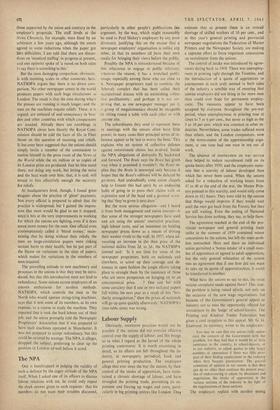The NPA
One is handicapped in judging the validity of such a defence by the cagey attitude of the NPA itself. When I asked one of its officers to discuss labour relations with me, he could only repeat the stock answer given to such requests: that his members do not want their troubles discussed, particularly in other people's publications (an argument, by the way, which might reasonably be used to Paul Slickey's employers by any poor divorcee); justifying this on the excuse that a newspaper employers' organisation is unlike any other, in that its members all have their own media for bringing their views before the public.
Possibly the NPA is misunderstood because of this reluctance to engage in public relations; whatever the reason, it has a wretched public image, especially among those who are close to it. Newspaper proprietors tend to combine the Jehovah complex that has been called their occupational disease with an astonishing collec- tive pusillanimity: and perhaps it is not sur- prising that, as one newspaper manager put it, group of megalomaniacs should be incapable of sitting round a table with each other or with anyone else, . The subordinates they send to represent them in meetings with the unions often have little power; in many cases their principal terms of re- ference appear to be 'not to worry the boss.' This explains why no system of collective defence against extortionate claims has evolved. Inside the NPA allegations of disloyalty fly backward and forward. The Brute says the Beast has given way when it promised it wouldn't; the Beast re- plies that the Brute is interested only because it hopes that the Beast's editions will be delayed by go-slows. And undoubtedly some union chapels help to foment this bad spirit by an endearing habit of going in to press their claims with an expressive nod of the head and a grunted warn- ing that 'they've given it next door.'
But the most serious allegation—and I heard it from both management and union sources—is that some of the stronger newspapers have used and are using the unions' restrictive practices, high labour costs, and an insistence on holding newspaper prices down as a means of driving their weaker rivals to the wall. In 1957, when ad- vocating an increase in the then price of the national dailies from 2d. to 3d., the NATSOPA journal said : 'Is it not time for some of the newspaper proprietors, both on nationals and elsewhere, to screw up their courage and de- nounce in open fashion the jungle efforts taking place to strangle them by the insistence of those who are more prosperouS on hanging on to an uneconomical price. . . ? One can bet with some certainty that if one or two national papers fall within the next year as a result of this "bro- therly strangulation," then the prices of nationals will go up quite quickly afterwards.' NATSOPA's time-table alone was wrong.






































 Previous page
Previous page